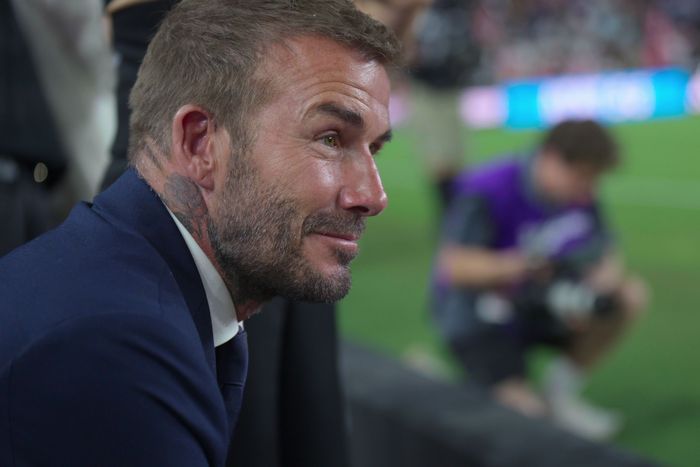
Fisher Stevens has a lovely tool in his bag of tricks for Beckham. It’s a visual device where the camera fixes its lens directly on the face of its titular subject. The viewer stares into his gaze as he stares straight back, except he’s actually reacting to footage of a football match. Now 48, Beckham often lights up seeing his old career in action, a sense of longing on his face. We watch him watch flashes of his former glory — and grievous wounds, as in the case of his infamous lashing out at Argentinian player Diego Simeone during the 1998 World Cup, which earned Beckham a red card and the wrath of his country.
But Stevens doesn’t just limit this device to his star. He deploys it on a handful of other footballing greats who’ve crossed into Beckham’s universe over the years: Eric Cantona, Roberto Carlos, Luis Figo. Some Beckham antagonists are also framed in this way, including Simeone himself, who smirks watching his on-field altercation with England’s golden boy. These shots add an affecting clarity to Beckham, an otherwise conventional celebrity docuseries. Traditionally, celeb docs find their value in the dialectical truth that emerges from the tension between what the documentarian wants to see and how the subject wants to be seen. But the genre is mostly marketing pablum nowadays, as modern entries rarely get made without direct approval from the subjects themselves. (Beckham is an executive producer of Beckham.) Thus, tension barely exists in the format any more, and we seem to have largely accepted that as a viewing public.
This isn’t to say celeb docs can’t be fun or interesting to watch. Harry & Meghan is little more than sponcon but thrills in its spectacle of palace intrigue and international celebrity. With Beckham, it’s a delightful thing to see these legendary players in their eras of quiet retirement, and I damn near teared up when a now-pudgy Ronaldo Nazário appeared onscreen. But these projects are structurally limited in terms of authenticity, since the goals of the doc and its subject are now almost always forced to align. Here, the Beckhams’ clear intent is to reclaim and exert further control over their narratives. As a production, Beckham is happy to oblige. The modern challenge for the documentarian, then — one who isn’t satisfied with serving as part of the subject’s public-relations apparatus, anyway — is finding ways to extract genuine insight despite the limitations of the form.
Stevens is an intriguing choice in this regard. A prolific actor, he’s most recently recognizable as Hugo Baker, Waystar Royco’s sweaty communications executive on Succession. But Fisher is also an accomplished and versatile documentarian; he produced The Cove, the Oscar-winning 2009 doc about dolphin-hunting practices in Japan, as well as Tiger King, the early-pandemic sensation. His directorial portfolio includes a number of environmental docs, most prominently Nat Geo’s Before the Flood, produced by Leonardo DiCaprio. According to an interview Stevens gave the Guardian, the DiCaprio connection played a huge role in Beckham handing this gig to Stevens, who is a football fan but was generally unfamiliar with Beckham’s story.
Stevens trucks along the authorized-biography route, motivated in large part by emphasizing the “operatic” nature of his subject’s life. In four episodes, some stretching longer than an hour, Stevens outlines the major beats of Beckham’s career: his early success at Manchester United, his marriage to Victoria Adams (who effectively serves as the secondary focus of the series), the aforementioned World Cup ’98 debacle, his recovery and eventual departure for Real Madrid, and the strange cluster of club moves preceding his retirement in 2013. The series closes on his co-founding of Inter Miami FC, the glitzy MLS team now home to Lionel Messi. It’s all fairly dutiful stuff, but Stevens consistently squeezes out compelling moments from the edges of the celebrity-docuseries formula. There are the lighter insights, as with the now-viral clip in which David playfully (but brutally) fact-checks Victoria’s claim that she “grew up working class.” More pointedly, the series is a subtle probing of Beckham’s relationship with the sport and celebrity. “I just wanted to make everyone happy,” he says in a sequence that’s meant to underscore his redemption after the ’98 World Cup incident but nevertheless lands with intense bittersweetness.
Beckham’s athletic ambition, mixed with his delight at global stardom, came at real cost to his family, and one of the main through-lines in Beckham is the burdens shouldered by Victoria. With each career move he makes (some necessary, others more capricious), she talks about being left alone to handle the delicate logistics of maintaining their young family under intense public scrutiny. The docuseries often feels like the Beckhams’ opportunity to publicly process the lingering effects of their fame, while of course expanding that fame with a greater sense of control. But this control is the doc’s ultimate flaw. As much as Beckham probes them, it never fundamentally questions Beckham’s choices and actions throughout his career. As a documentary whose subject serves as executive producer, how could it?
Stevens is an active presence within the series, appearing in establishing shots and heard asking questions, and Beckham never escapes the polite chumminess that exists between him and his subject, emphasizing the places the doc simply cannot go. The fourth episode opens with the tabloid frenzy spurred by allegations of Beckham’s having an affair after moving to Real Madrid. In interviews, the couple frame the incident around the cravenness of the tabloids, but Stevens barely prods the underlying claims, which were made by several women at the time. (Beckham denies the allegations.) This was an opportunity to set the record straight, but Stevens practically waves the allegations away, redoubling the doc’s focus on the media circus impacting Beckham’s family and performance on the pitch.
The director also leaves plenty of other threads on the table. Beckham’s relationship with Alex Ferguson, the Manchester United coach whom he loved as a father figure, was strained in large part by his getting together with Victoria and subsequent elevation into celebrity. How did Beckham really feel about that? How did she? And how did Ferguson, for that matter? Beckham had considerable access to all three people, yet this dynamic never feels explored.
The final episode wraps on Victoria Beckham regarding her interviews as “therapy,” building to a triumphant, treacly note that wouldn’t feel out of place in a hagiographic biopic. The series frames Beckham as having achieved a kind of balance, modulating between contentment with life after professional football and channeling his innate relentless energy into ownership of an American soccer club. It’s too neat to feel honest about the complicated life we watched play out across four hours. Stevens may find flashes of real emotion staring into Beckham’s face, but that’s as far as he’s allowed to go.





